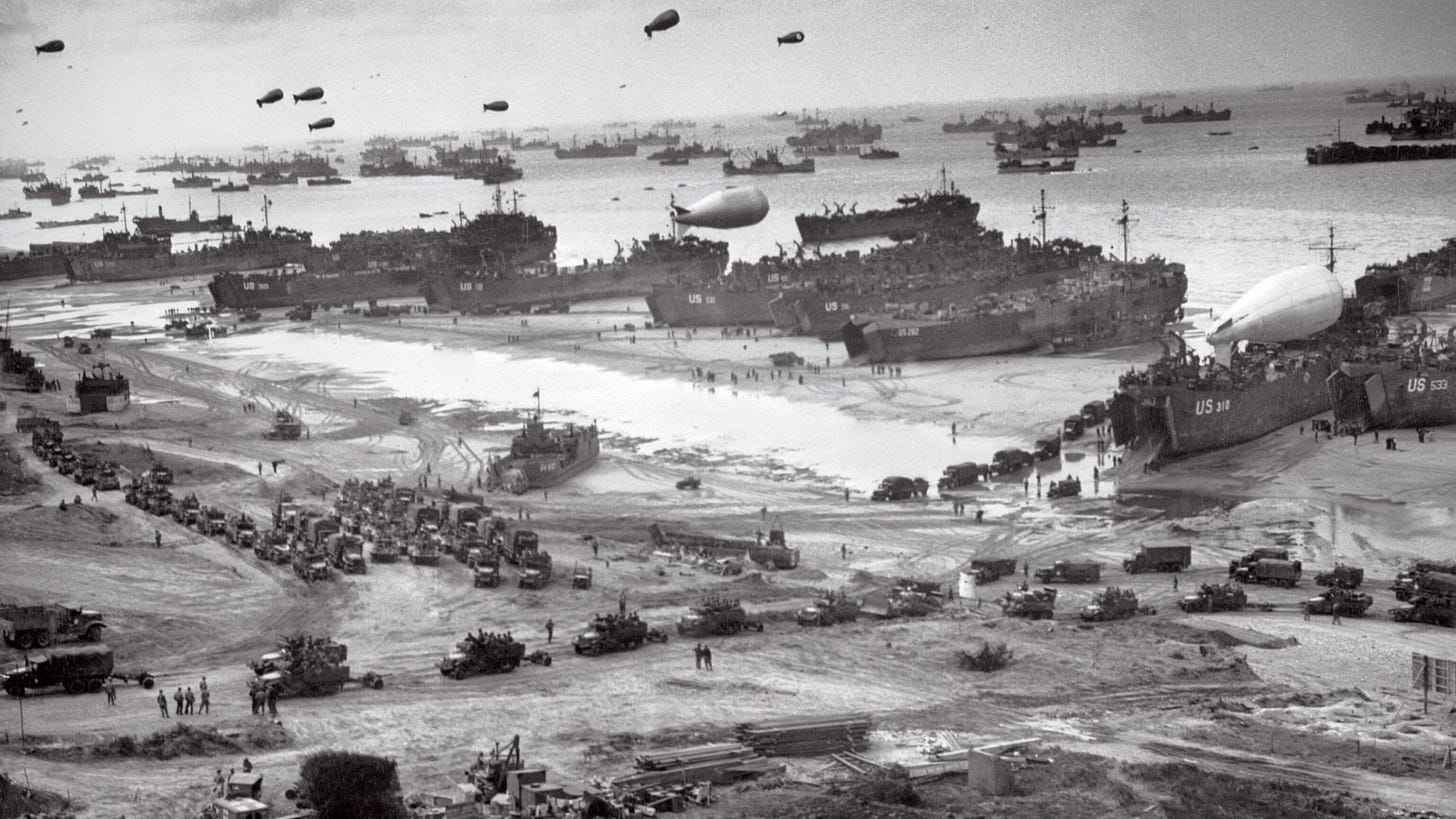Remembering D-Day at 81
Eisenhower’s Plea for Peace
Last Friday was the 81st anniversary of D-Day, the day that 160,000 allied troops famously stormed the beaches of Normandy to begin the task of retaking Western Europe from the Nazi dictatorship. A favorite historical gem of mine related to this day is an interview of Dwight D. Eisenhower by Walter Cronkite on the 20th anniversary of D-Day in 1964 (video below). In the final minutes, the former general and president makes a powerful plea for global peace.
“I devoutly hope that we will never again have to see such scenes as these. I think and hope and pray that humanity will learn more than we had learned up to that time. But these people gave us a chance, and they bought time for us, so that we can do better than we have before.”
“So every time I come back to these beaches, or any day when I think about that day 20 years ago now, I say once more we must find some way to work to peace, and really to gain an eternal peace for this world.”
- Dwight D. Eisenhower
Some things you might not know about the D-Day landing:
As a diversion, the US military built a dummy army and navy, generated fake radio transmissions, and allowed German reconnaissance of the fake army. This was known as Operation Fortitude. General George Patton was assigned as the commander. Patton had been reassigned from combat due to an incident where he slapped an American soldier who had a nervous breakdown from shell shock. The Germans, allegedly, could not believe that something as simple as this would make the Americans take their best field general out of play.
The Germans thought that the Allied forces intended to land on a flatter beach closer to England. Operation Fortitude attempted to create the perception that the Allies would embark from Dover, England, which was much further east than Normandy and near the shortest crossing of the English Channel. The beaches of Normandy had sheer cliffs and thick hedgerows, and where not the best place for an amphibious landing geographically. However, the advantages of surprise made this less of a problem.
The invasion was delayed by a day due to bad weather. This created logistical challenges, but given all the things that went wrong on the initial landing under fair weather: transports running aground in the wrong place, the ships stopping to far from the beach, soldiers killed by artillery from what planners thought were more lightly defended positions, shows the wisdom of this.
One of my favorite stories, memorialized in a speech by Ronald Reagan on the 40th anniversary of D-Day, was the storming of Pointe du Hoc by a division of 255 Army Rangers. Their leader, James Earl Rudder, hailed from the small Texas town of Brady, which is near the geographical center of the state. He went on to become the president of Texas A&M university, my alma mater. By the time these Rangers had secured the cliffs, which they scaled with daggers thrust into the cliffside and rope ladders, only ninety were in fighting condition.
There is nothing comparable happening today, but I am concerned with the coming together of several theaters into a larger conflict. Ukraine is fighting Russia in a massive land war in Europe, an air battle is shaping up between Iran and Israel, and China is rattling its sabers in Taiwan. And all three have a loose, ad hoc alliance.
The second world war began with a similar slow burn that turned into a conflagaration. Germany annexed Austria in 1938, followed by Czechoslovakia in 1939. Japan’s invaded Manchuria in 1931 and escalated to full-scale war with China by 1937. Italy invaded Ethiopia in 1935. In the meantime, the United States was on the sidelines, Europe was rearming, and the Soviets were looking to cut a deal over Eastern Europe. There was a possibility these conflicts would come together, but no guarantee that they would.
The Tripartite Pact between Italy, Germany, and Japan was only a loose alliance. It created spheres of influence, but did not obligate the signatories to come to each other’s defense. The alliance between China, Russia, and Iran is even looser, and China has been reluctant to openly and publicly support the war in Ukraine. In fact, China, given its growing commercial ties with Europe, has an interest in not antagonizing its trade partners.
While there are some parallels, there is not a reason to be as concerned as in 1937. As Eisenhower says so eloquently at the end of his interview, the boys at Normandy and their sacrifice bought us time to stop the scourge of war. My hope is that we use it wisely, and do not squander the peace dividend of the last 80-plus years that we have all had the good fortune to live under.



